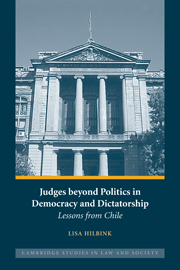Book contents
- Frontmatter
- Contents
- Acknowledgments
- Introduction
- 1 The Judiciary, the Rule of Law, and Democracy: Aspirations and Impediments
- 2 The Institutional Construction of the Judicial Role in Chile
- 3 Conservative Activism in the Heyday of Democracy, 1964–1973
- 4 Legitimizing Authoritarianism, 1973–1990
- 5 Continuity and Change after the Return to Democracy, 1990–2000
- 6 Conclusions and Implications
- Appendix A Orienting Information on Chilean Law and Courts
- Appendix B List of Interviewees (alphabetical by category)
- References
- Index
1 - The Judiciary, the Rule of Law, and Democracy: Aspirations and Impediments
Published online by Cambridge University Press: 08 January 2010
- Frontmatter
- Contents
- Acknowledgments
- Introduction
- 1 The Judiciary, the Rule of Law, and Democracy: Aspirations and Impediments
- 2 The Institutional Construction of the Judicial Role in Chile
- 3 Conservative Activism in the Heyday of Democracy, 1964–1973
- 4 Legitimizing Authoritarianism, 1973–1990
- 5 Continuity and Change after the Return to Democracy, 1990–2000
- 6 Conclusions and Implications
- Appendix A Orienting Information on Chilean Law and Courts
- Appendix B List of Interviewees (alphabetical by category)
- References
- Index
Summary
This book examines how and why Chilean judges trained and appointed under democratic governments lent such robust support to the Pinochet regime. Although the analysis has obvious relevance for Chileans and scholars of Chile, it was motivated by and speaks to much broader theoretical concerns. Comparative politics theorizing on democratization has recently begun emphasizing the need for the rule of law to support and sustain democracy, and the need for judicial reform as a primary means of building the rule of law (Linz and Stepan 1996; Frühling 1998; Hammergren 1998; Domingo 1999; Prillaman 2000; Zakaria 2003). However, there remains relatively little description in the literature, much less empirical analysis, of how the judiciary functions (or has functioned) in most democratizing countries, and especially not in Latin America. Thus, it is still unclear what precisely about judicial institutions requires reform in such countries, or what the limits of institutional reform might be. Meanwhile, in the American public law literature, abundant analysis of judicial functioning, particularly at the Supreme Court level, has produced heated debates regarding if and how institutions affect judicial behavior. However, these debates are greatly limited by an almost exclusive focus on the American case. This book thus brings theoretical concepts and debates from public law to bear on comparative politics theories of democratization, and contributes empirical insights from a comparative (non-U.S.) case to address theoretical debates in public law.
- Type
- Chapter
- Information
- Judges beyond Politics in Democracy and DictatorshipLessons from Chile, pp. 13 - 40Publisher: Cambridge University PressPrint publication year: 2007



